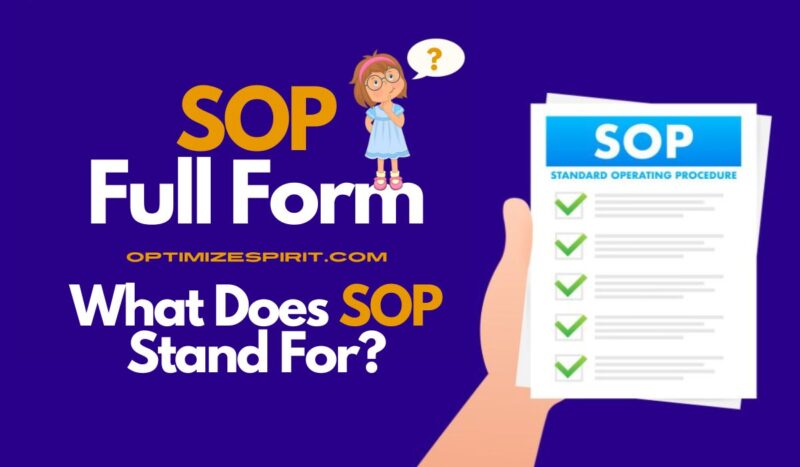SOP Full Form: The full form of SOP stands for Standard Operating Procedure. It is a structured method for offering guidance, management, and alignment for the smooth and productive functioning of a business. SOPs serve as a blueprint for handling various scenarios, including emergency protocols.
Establishing SOPs is crucial for businesses to enhance their operational efficiency and effectiveness. Below are some steps you can follow to develop your own Standard Operating Procedure.
What is SOP? | SOP Full Form
SOP Full Form is Standard Operating Procedure. An SOP is a set of instructions provided by an organization to its staff to effectively carry out routine and day-to-day operations. These instructions encompass various aspects such as management procedures, operational guidelines, and specific tasks to be performed, detailing when and how they should be executed.
SOPs serve to familiarize employees with their regular duties and responsibilities within the organization. They can vary in scope and purpose, but ultimately aim to streamline processes and ensure consistency in performance. For instance, in marketing, a Strategy SOP outlines the actions necessary for achieving the organization’s objectives, spanning across marketing, sales, and financial domains.
Why do companies use SOPs?
Companies utilize Standard Operating Procedures (SOPs) to ensure compliance with actions and instructions for both customers and employees within a specific setting. These SOPs serve as guidelines, particularly in industries like baking, to uphold safety and quality standards while minimizing conflicts between customer expectations and company policies. Additionally, SOPs aid in optimizing the quality of work performed by employees, consultants, or vendors, and provide clarity on specific duties and responsibilities within the organization.
How can you implement SOP in your organization?
To implement Standard Operating Procedures (SOPs) within your organization, start by convening a meeting involving senior management, managers, owners, and relevant employees. This meeting should focus on clarifying the purpose of SOPs, identifying the stakeholders who will benefit from them, and strategizing efficient ways to implement them effectively.
How does a company develop and enforce SOPs?
Developing and enforcing Standard Operating Procedures (SOPs) involves several steps. Firstly, it begins with defining the purpose and objectives of the program. Then, specific standards and major roles are outlined.
When a company introduces a new SOP, it typically starts with announcing the new strategy. Approval is usually required for a new SOP, as per regulations like Ontario Regulation 261/2002, which governs companies under the Companies and Mutual Funds Act in Ontario, Canada. According to this regulation, companies must submit their SOPs to the Financial Services Commission (FSCO) to ensure compliance with Ontario standards. Additionally, a senior officer within the organization must approve the new SOP before implementation.
How are SOPs useful for the industry?
Standard Operating Procedures (SOPs) play a crucial role in the industry by promoting efficiency and accuracy in operations. They provide a standardized framework for carrying out tasks, reducing the likelihood of errors and conflicts within teams. SOPs are increasingly adopted by organizations to streamline processes and ensure consistency in performance.
When developing SOPs, it is important to identify key aspects and design a clear structure for implementation. Each step should be accompanied by detailed instructions, ensuring that tasks are carried out effectively. Additionally, clear guidelines should be established for different tasks and projects to maintain clarity and coherence throughout the operation.
Conclusion | SOP Full Form
In Conclusion SOP Full Form, there are various types of SOPs, each with its own set of key points that influence the optimal strategy to adopt. When selecting SOPs, it’s crucial to consider factors such as the urgency of the activity, ensuring swift initiation.
An effective SOP should be transparent, readily available, and straightforward to put into practice. Each SOP brings distinctive capabilities and fulfills specific roles vital to the success of the overall initiative. A well-designed SOP facilitates the implementation of certain actions while streamlining others. Engaging expert review of SOPs and addressing their challenges promptly can significantly enhance operational processes.








